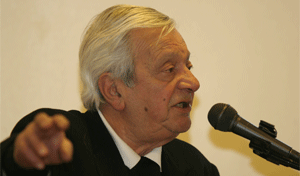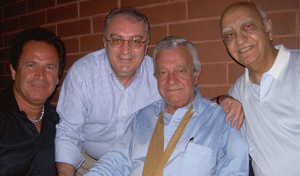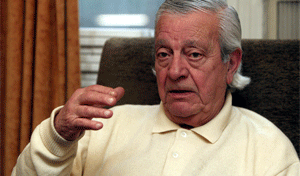Dr. Zeki Uygur: A Treasure for Turks in New York
Among the immigrant ethnic groups in the U.S., there have always been people who dedicated themselves to the people of their home countries. They become worried when their compatriots are worried, they become sad when they are sad. They help without any expectations in return. They are concerned about helping their people, not their own benefit, despite the capitalist system.

Photo by Cahit Oktay, Forum Newspaper.
They could adapt to the cycle and make millions to have a comfortable and trouble-free way of life, just like many of their co-workers. Instead they choose to conquer the hearts of their people.
They do not play cheap games like getting a “Lifetime Achievement Award” award after donating a couple of thousand dollars to some businessman’s foundation. They are not in the media aimlessly. They do not have their pictures published in magazines.
One of these people is Zeki Uygur, whose name is mentioned with respect and gratitude by many Turks in New York.
We had been planning to tell his life story after the interview we would have with him. Melda Akansel, who helped a lot with this edition, arranged an appointment and saw Zeki Uygur in his office. Dr. Uygur politely refused Melda’s interview request. He had thought she was one of the Turks in need of help. He said, “Let’s sit down, I will talk, we can chat but you are not allowed to use it in the magazine.” Zeki Uygur does not like talking about himself.
As we felt it was a binding duty to tell about the national treasure of the Turks in the U.S., this gentleman of Istanbul, TURKOFAMERICA asked his close friends and fellows about Dr. Uygur. As they told us about him, we enjoyed the opportunity to get to know this great treasure of Turks in New York.
A NAVY OFFICER
At the opening of his art exhibition at the New York Turkish Cultural Center in April 2007, Dr. Zeki Uygur gave some details about his life:
He graduated from the Medical School of Ankara in 1950. He was an officer in the Navy. He served 3.5 years as a doctor on Turkish naval ships, including Ataturk’s ship, the Savarona. In 1952, he was sent to the U.S. as a member of a 200-person crew in charge of receiving 3 torpedo ships while he was serving as a flotilla doctor with the rank of lieutenant on the destroyer; the Gaziantep.
As the ship approached Staten Island, one soldier fell off and injured his head. Dr. Uygur helped the injured soldier get treatment by taking him to several hospitals. It was this event that led Dr. Uygur to do his specialty training in neurosurgery.
After having completed his 3.5 month duty in the U.S., he returned to serve at Gulhane Military Medical School in Istanbul.
Dr. Uygur finished his specialty training in general surgery at Gulhane Military Medical School between the years 1954 and 1957. He was sent back to the U.S. by the insistent effort by his teacher Dr. Recai Erguder while he was working as a senior consultant at the academy. He continued his education at St. Albans Naval Hospital. He did not get the chance to finish his studies because in March 1960, the military staff made a decision ordering all the military students abroad to return to Turkey. Dr. Uygur went back to his job in Gulhane Military Medical School.
Dr. Uygur witnessed the first military coup in Turkey on May 27, 1960. He even knew 30 of the 38 officers who carried out the coup from the period when he used to work as a doctor at Gulhane Military Medical School. After the coup, in 1961, he was sent back to Iowa University to go on his brain surgery education. He finished his specialty training in brain surgery in 1965.

Dr. Zeki Uygur with his friends Burhan Ozcan, Mehmet Guven and Ozdemir Kosal at one of Young Turks meetings in New York.(From left to right) (Photo Courtesy of Mehmet Guven)
Dr. Uygur’s dream was to open the brain surgery department in Gulhane Military Medical School when he returned to Turkey. He ignored his professor’s insistent advice to stay in the U.S. Dr. Uygur became angry when his professor said, “I worked as a visiting professor at Athens University for 2 years. There’s no difference between Greece and Turkey, you can’t do it.”
Dr. Uygur returned to Turkey in 1965 and started to work at the neurosurgery department in Istanbul Kasimpasa Hospital, since the neurosurgery department at Gulhane Military Medical School had already been opened by a colleague.
After having worked for 4 years in Kasimpasa Hospital, he retired from the navy in 1969 with the rank of colonel. Then, he immigrated to New York. From his first days in the city until now, he has been determined to help the Turkish community and whoever needs a doctor.
HE STILL DOES NOT TAKE ANY MONEY
Well-known for the fact that he does not take any money from his Turkish patients, Dr. Uygur has been taking care of his patients in Brooklyn for several years. These days, he is in midtown Manhattan, taking care of his patients 2-3 days a week. Attorney Cahit Akbulut, who has known Dr. Uygur for 20 years and has shared the same office for the last 7 months, complains about the fact that Dr. Uygur still doesn’t ask for any money from his Turkish patients. Akbulut says, “He does not take any money from those who don’t have it but when the ones who have it are reluctant to give money, I demand our administrative assistant to take care of the money issues.”
When asked what kind of personality Dr. Uygur reminds him of, Akbulut answers “A perfect personality; someone who cares about human lives, not money.”
YOUNG TURKS
Dr. Uygur has been attending a group meeting continuously for the last 40 years. The members of the group call themselves “Young Turks”. The founders of the group are Dr. Zeki Uygur, along with journalist Dogan Uluc and Sinan Korle. The members of the group believe the success in the continuity of the group all this time has depended on three factors. The first one is that they do not talk about politics. The second one is that religion is never a topic in any discussion. The third and last one is the fact that spouses are never invited to these meetings. Around 30 people participate in each meeting. He was awarded a “thank you plaque” by his friends because of his contributions to the Turkish community at one of these meetings.
One of Uygur’s closest friends, Emirhan Buzlucali, points out that Dr. Uygur is very interested in Turkish literature. Dr. Uygur recites poems that have themes of love for one’s homeland and nation at the meetings of the Young Turks. Buzlucali, who has known him for 25 years, says, “Whoever needs a doctor, no matter in which different specialty, he finds the best doctor. He is a kind of a health consultant for our community.”
NO MORE SURGERY
Dr. Uygur stopped doing surgery in 2005. His biggest wish is for the removal of the monetary relations between the patients and the doctor. He says, “We doctors should not be thinking about money, it should be other people’s job to do so.”

Dr. Zeki Uygur. (Photo by Mehmet Demirci, Zaman Newspaper)
His close friend Mehmet Guven, who has known Dr. Uygur for 35 years, says, “If Zeki Uygur had cared about money, he would be a millionaire now, but money has never been a priority for him.” Mr. Guven also adds that he knew only two names from the piece of paper that he was given when he first came to the U.S. in 1974. One of these names was Dr. Uygur. Mehmet Guven, who retired from the Permanent Mission of Turkey to the United Nations, says he has not met one person who talked negatively about Dr. Uygur.
LOOK AT THE RESULT… IS HE HEALING?
Mehmet Guven has a memory that he witnessed with Dr. Zeki Uygur; a memory he can never forget. In the midst of 80’s, Yavuz, a police officer working in the Turkish Consulate, had a child with a chronic disease and the child needed treatment. The child was first brought to Dr. Uygur. After having treated him, Dr. Uygur forwarded the child to other doctors for other tests and treatment. He also asked these doctors to forward the bills to him. Not only did he not take any money for treating this child but also he paid all these bills from the other doctors. Dr. Uygur also handed money in an envelope to the father’s child while he was in the hospital, asking to contribute more. Mehmet Guven felt like crying when he told us about the story. He said, “Whenever I told Dr. Uygur that he is not taking money but they misuse his good intention, he always comes up with the same response: ‘Look at the result, Mehmet… Is he healing?’”
HE OPENED AN ART EXHIBIT
His friends say that Dr. Uygur is a passionate Fenerbahce, one of the most popular sports club in Turkey, fan. He tries not to miss any of their soccer games and he usually watches the games with his closest friends, Emirhan Buzlucali and Prof. Etem Erol, at Ali Baba Restaurant in Midtown Manhattan.
Another passion that Dr. Uygur has is art. Dr. Uygur lives in Long Island and he exhibited the pictures he drew during the trips he made between his house and his job in New York. He opened his last exhibit in April 2007. At the opening of the exhibit, he said, “No matter how many operations I have done, I would always do my next surgery with the excitement as if it was the first surgery. The 24-48 hour period after the surgery is very stressful. This exhibit includes what I drew to relieve my mind.” Having started in 1974, Dr. Uygur has drawn over 1,000 pieces, most of which were done on his train trips.
Dr. Uygur has always felt worried about the condition of the patient after the surgeries. He says even if he learns from the doctors that the patient is fine at night time, in the morning he would think about which foot he should step forward with to enter the hospital for good luck.
“There is a big difference between now and the 60’s & 70’s” Dr. Uygur says. “We, doctors, used to struggle in small hospitals in those years. In recent years, it is very common to see Turkish doctors in the management departments of big hospitals. These doctors have achieved great success. I am proud. Now, forget about Zeki Uygur!” he adds humbly.
Dr. Uygur is also very proud of keeping the promise that he gave to his mother not to change his name when he came to the U.S.. Dr. Uygur treated thousands of patients free of charge. He does not drive a car. He lives in a rented house in Long Island. He has been married to Ayla Uygur since 1953 and they have two children. Dr. Uygur does not consider retiring. One of his favorite hobbies is going fishing. His favorite fish is young blue fish.
THE STORY OF THE COP HE SAVED BECAME A MOVIE
A very memorable event in Dr. Zeki Uygur’s life was saving the life of the police officer who revealed one of the worst corruption scandals in the history of New York Police Department. Dr. Uygur was the first to treat officer Frank Serpico when he was brought to the emergency room at New York Greenpoint Hospital on February 3, 1971 after Serpico had been shot in a clash with his colleagues. When Frank Serpico wrote a book about his memories, he mentioned Zeki Uygur in his book as the Turkish doctor who saved his life in that hospital. Later, Frank Serpico’s life story was turned into a movie by the director Sidney Lumet. Al Pacino played officer Frank Serpico in the movie. Dr. Uygur never told the media about Frank Serpico.
DEDICATION TO HUMANITY & HIS PEOPLE
Dr. Uygur shows the same care and closeness to everyone whether they are a police officer well-known to Americans or a refugee just off the boat. His close friend Mehmet Guven summarizes Dr. Uygur’s sensitivity in these words: “Let’s say a young Turkish man working in a gas station at the very end of Long Island had an accident and Dr. Uygur coincidentally heard this. He would not hesitate, he would not delay, he does not have a car but you would see him getting a train or a taxi to reach that hospital to help this young Turkish man. He would help him monetarily. While going to this young man, he would not tell anyone about this, he would not ask anyone to give him a ride. He is nonpareil.”
“Whenever someone in the Turkish community has any difficulty with the police, they first try to find me. If anyone has a health problem, they try to reach Dr. Uygur,” says Erhan Yildirim, a liaison between the New York Police Department and the Muslim community in New York. He adds, “We, as a Turkish American community, are a very big family in the U.S. and Dr. Uygur is like our abi (the Turkish word for elder brother).”
ANOTHER SALVATOR ALTCHEK
One of the members of Young Turks Group, who did not wish his name published, said Dr. Uygur is like Dr. Salvator Altchek for the Turkish community. Dr. Salvator Altchek, who was known for 67 years as the $5 doctor to the melting pot of Brooklyn, especially the poorer residents of affluent Brooklyn Heights, died in September 2002. He was 92. According to the New York Times, Dr. Altchek continued to work until two months before his death. He delivered thousands of babies and generally attended to the health needs of anyone who showed up at his basement office in the Joralemon Street row house in the Heights where he lived, charging $5 or $10 when he charged at all.
The member of the Young Turks Group said Dr. Uygur has never been motivated by money and he added: “He has been practicing since 1969 in the U.S. If you compare him to the other brain surgeons who have worked that long, they have least two houses, loads of money in the bank and comfortable lives, but Dr. Uygur does not.”
He told a story concerning Dr. Uygur helping his poor patients: “I heard the story from the patient himself. When Dr. Uygur was practicing in Long Island, NY, a Turkish patient needed a doctor. He found Dr. Uygur’s contact number and called him. He said he needed a doctor but he did not have money. He was not able to come to the hospital either. At that time, Uygur was working in New York City. Uygur got his address and traveled to the address from New York City. After treating the patient, he went to the pharmacy and paid for the medicines which the patient needed. To this day, that person tells this story about Dr. Uygur.”
A POEM BY DR. ZEKI UYGUR
Every morning I start my word,
Every morning with gratitude.
I drank from your water,
I ate from your bread.
With you functions my old hands.
My feet disregard the uphill or the flat
I inhaled and exhaled your air
It was your love filling me inside
You are the melody, you are the song, Turkiye
You are my precious, my homeland, Turkiye
I kiss your hands…
Dr. Zeki Uygur
&&&&&&&&&&&&
DR. ZEKİ UYGUR’UN BİR ŞİİRİ
Her sabah başlarım söze,
Her sabah şükrederek.
Suyundan içtim,
Ekmeğinden yedim.
Sayende iş tutar hala yaşlı ellerim.
Ayaklarım aldırmaz yokuşa düze
Havanı aldım üfledim
Sevgindir içime dolan
Sen bestesin, güftesin hep Türkiye
Sen daima sevgili aziz vatanım Türkiye
Ellerinden öperim...
Dr. Zeki Uygur
Last modified onSaturday, 06 May 2017 10:07
Latest from Admin TOA
- World Energy Council Türkiye Holds the Opening Meeting of the Young Energy Leaders (YEL’26) Program
- The Shared Pulse by Eda Uzunkara
- NEO HUMAN 10.0: How Will the Future Be Shaped? (Filiz Dag)
- Calculatit.net Is Bringing Pricing Transparency to America’s Construction Industry
- Support Independent, Trustworthy Journalism








